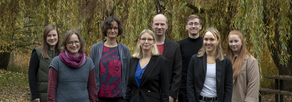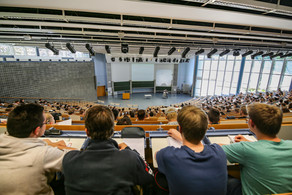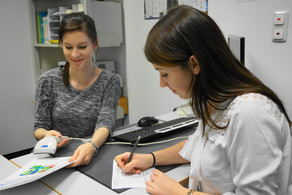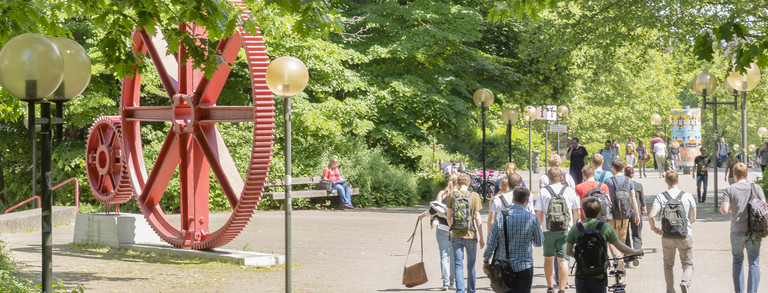Bildungswissenschaftliches Wissen und der Erwerb professioneller Kompetenz in der Lehramtsausbildung
The project „Bildungswissenschaftliches Wissen und der Erwerb professioneller Kompetenz in der Lehramtsausbildung" ["Educational Science Knowledge and the Acquisition of Professional Competence in Teacher Education"] (BilWiss) addresses the discussions about the improvement of teacher education. The relationship between theory and practice, especially in university education, is a frequent topic of discussion. There, especially educational science parts are perceived as arbitrary in content and not very cumulative. Based on psychological theories of knowledge acquisition, it is assumed that the scientific content acquired during university education is a fundamental condition for the later acquisition of competencies. The basic hypothesis of the BilWiss project was that educational science content and contexts provide a conceptual framework that teachers need in order to appropriately interpret and reflect on classroom and school events and thus use them for their own competence development. Thus, achieving a theoretical systematization of educational science content represented a major goal of the project (Kunter, Leutner, Terhart & Baumert, 2014).
Building on this, the focus of the second project phase, „Die Bedeutung des bildungswissenschaftlichen Hochschulwissens für den Berufseinstieg von Lehrkräften" ["The significance of educational science university knowledge for the career entry of teachers"] (BilWiss-Beruf) , was predominantly on the question of the practical relevance of educational science knowledge for action. The basic assumption here is that certain educational science content areas are also predictive for different task areas (Kunter et al., 2014).
Overall, a competency test was developed in the first two project phases "BilWiss" and "BilWiss-Beruf". The aim was to assess the educational science knowledge of student teachers and teacher graduates. The competence test was further developed and validated in the third project phase „Ertrag und Entwicklung des universitären bildungswissenschaftlichen Wissens – Validierung eines Kompetenztests für Lehrkräfte“ ["Yield and Development of University Knowledge in Educational Science - Validation of a Competence Test for Teachers"] (BilWiss-UV). With the help of validation studies, the possible applications for research and educational monitoring were to be examined. Furthermore, the longitudinal sample from the first two project phases was continued in the third project phase in order to investigate the long-term yield of educational knowledge. In addition to the longitudinal sample, a multi-cohort longitudinal sample was launched with student teachers at the different project sites. The longitudinal multi-cohort sample is intended to examine changes in educational science knowledge. In addition, one goal is to correlatively attribute changes in educational science knowledge to attendance at learning opportunities in the educational science portion of the study (Kunter et al., 2014).
The project was funded by the German Federal Ministry of Education and Research (BMBF) in the funding initiative " Competence Models and Instruments for Competence Assessment in Higher Education - Validation and Methodological Innovations" (KoKoHS) (Kunter et al., 2014).
To test this assumption, educational science themes were developed theoretically through document analyses and identified empirically through a Delphi study with teacher education experts in several steps. These themes formed the basis for the development of a measurement instrument that would allow the objective and direct assessment of the declarative and conceptual-analytical knowledge of teacher candidates (LAA). After piloting and field studies to test the items, an instrument with 289 tasks (mainly multiple choice items) was available. In the next step, the knowledge test was administered in the main study of the BilWiss project at all study seminars in North Rhine-Westphalia (NRW) with a cohort of 3298 university graduates who were directly at the beginning of the second training phase (the preparatory service). The statistical analysis of the test data showed that the knowledge test can be used to measure the six educational science dimensions of instructional design, learning and development, diagnostics and evaluation, educational theory, school as an educational institution, and teaching as a profession. Part of the LAA from the main study (n=362) participated in an interim survey after one year in the preparatory service as part of the longitudinal study (Kunter, Leutner, Terhart & Baumert, 2014).
In the BilWiss-Beruf study, a multicriterial perspective was adopted in order to investigate the successful accomplishment of various tasks in the teaching profession. In the context of this second project funding phase BilWiss-Beruf, the longitudinal study of LAA from the 1st project phase was continued: the LAA were surveyed again at the end of the preparatory service (n=284) as well as again approximately two years after the complete entry into the profession (n=101) (Kunter, Leutner, Terhart & Baumert, 2014).
In addition, the project aimed to investigate the development of educational knowledge as a function of different learning opportunities. Specifically, the focus was on examining the differential development of two cohorts of prospective teachers who went through different lengths and different forms of pre-service training. In order to compare the cohorts, a further sample of prospective teachers was drawn at the beginning (n=511) and at the end of the preparatory service (n=386) as well as approximately two years after entering the profession (n=104). The quasi-experimental design arose with the introduction of a reform of teacher education in the state of North Rhine-Westphalia, which was accompanied by changes in the preparatory service that took effect with the start of the preparatory service of cohort 2 (Kunter, Leutner, Terhart & Baumert, 2014).
More information
The project „Bildungswissenschaftliches Wissen und der Erwerb professioneller Kompetenz bei Lehramtskandidaten“ ["Educational Science Knowledge and the Acquisition of Professional Competence in Teacher Candidates"] (BilWiss), is a joint project between
- the Max Planck Institute for Human Development (Prof. Dr. Jürgen Baumert),
- the Goethe University Frankfurt (Prof. Dr. Mareike Kunter; project coordinator),
- the University of Duisburg-Essen (Prof. Dr. Detlev Leutner) and
- the Westfälische Wilhelms-Universität Münster (Prof. Dr. Ewald Terhart).
It was funded within the BMBF funding program "Empirical Educational Research" in the funding line „Entwicklung von Professionalität des pädagogischen Personals in Bildungseinrichtungen“ ["Development of Professionalism of Pedagogical Staff in Educational Institutions"] (ProPäda) (Kunter, Leutner, Terhart & Baumert, 2014).
The project „Die Bedeutung des bildungswissenschaftlichen Hochschulwissens für den Berufseinstieg von Lehrkräften“ ["The Significance of Higher Education Knowledge for the Career Entry of Teachers"] (BilWiss-Beruf) is a joint project between
- the Goethe University Frankfurt (Prof. Dr. Mareike Kunter; project coordinator),
- the University of Duisburg-Essen (Prof. Dr. Detlev Leutner),
- the Westphalian Wilhelms University Münster (Prof. Dr. Ewald Terhart)
- and the Technical University of Munich (Prof. Dr. Tina Seidel).
It was funded within the BMBF funding program of the funding line „Kompetenzmodellierung und Kompetenzerfassung im Hochschulsektor“ ["Competence Modeling and Competence Assessment in Higher Education"] (KoKoHs) (Kunter, Leutner, Terhart & Baumert, 2014).
For more information on the BilWiss project, please visit the website of the Institute for Quality Development in Education and the Goehte University Frankfurt am Main.
-
Holzberger, D., Maurer, C., Kunina-Habenicht, O., & Kunter, M. (2021). Ready to Teach? A Profile Analysis of Cognitive and Motivational-Affective Teacher Characteristics at the End of Pre-service Teacher Education and the Long-term Effects on Occupational Well-being. Teaching and Teacher Education, 100. doi:10.1016/j.tate.2021.103285.
-
Kunina-Habenicht, O., Maurer, C., Wolf, K., Holzberger, D., Schmidt, M., Dicke, T., Teuber, Z., Koc-Januchta, M., Lohse-Bossenz, H., Leutner, D., Seidel, T. & Kunter, M. (2020). Der BilWiss-2.0-Test: Ein revidierter Test zur Erfassung des bildungswissenschaftlichen Wissens von (angehenden) Lehrkräften. [The BilWiss 2.0 test: A revised test for assessing the educational science knowledge of (prospective) teachers]. Diagnostica, 66(2), 80-92. doi: 10.1026/0012-1924/a000238
-
Kunina-Habenicht, O., Maurer, C., Schulze-Stocker, F., Wolf, K., Hein, N., Leutner, D., Seidel, T. & Kunter, M. (2019). Zur curricularen Validität des BilWiss 2.0-Tests zur Erfassung des bildungswissenschaftlichen Wissens von (angehenden) Lehrkräften [On the curricular validity of the BilWiss 2.0 test for assessing the educational science knowledge of (prospective) teachers]. Zeitschrift für Pädagogik, 65(4), 542-556.
-
Kunina-Habenicht, O., Schulze-Stocker, F., Kunter, M., Baumert, J., Leutner, D., Förster, D., Lohse-Bossenz, H. & Terhart, E. (2013). Die Bedeutung der Lerngelegenheiten im Lehramtsstudium und deren individuelle Nutzung für den Aufbau des bildungswissenschaftlichen Wissens [The importance of learning opportunities in undergraduate teacher education and their individual use for building educational knowledge]. Zeitschrift für Pädagogik, 59(1), 1-23.
-
Kunina-Habenicht, O., Lohse-Bossenz, H., Kunter, M., Dicke, T., Förster, D., Gößling, J., Schulze, F., Baumert, J., Leutner, D. & Terhart, E. (2012). Welche bildungswissenschaftlichen Inhalte sind wichtig in der Lehrerbildung? Ergebnisse einer Delphi-Studie [Which educational science content is important in teacher education? Results of a Delphi study]. Zeitschrift für Erziehungswissenschaft, 15(4), 649-682. doi: 10.1007/s11618-012-0324-6
For a further selection of publications, see this list of literature (as of 20/05/2021).





